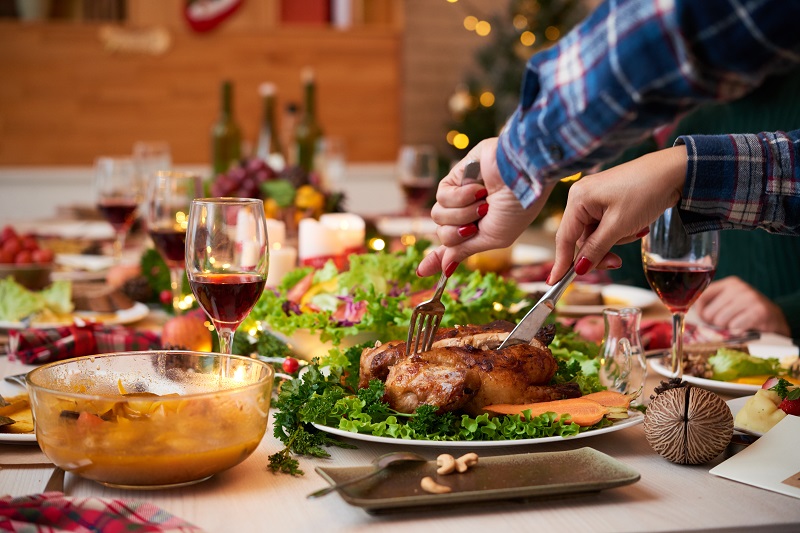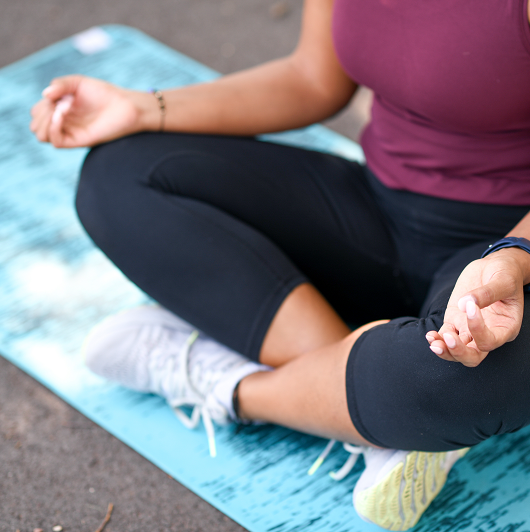5 Tips on How to Not Overeat During Holiday Dinner

November 15, 2022
"TV shows and movies often portray people overeating, then lounging around during holiday get-togethers,” says registered dietitian, Tara Mauro. “It’s important to enjoy what you’re eating, but you can do so without overdoing it.”
Here’s what you can do to avoid overeating this holiday season:
1. Plan and prepare for the occasion
Some people expect to overeat, so they skip meals beforehand, “saving” their calories. But by arriving famished or undernourished, you are more likely to overeat later.
Instead, eat a balanced breakfast, brunch and/or lunch ahead of time. Try to model your meal after the MyPlate diet, this is the USDA’s visual representation of how we should model our plates.

Source: U.S. Food & Drug Administration
Following MyPlate’s recommendations, your plate should be:
- Half fruits and vegetables
- Half of your grains should be fiberful whole grains
- A lean protein
- A low-fat or fat-free dairy
It’s okay if you decide in advance to bypass certain dishes during a holiday meal. You won’t miss out if you opt to have those foods another time.
“Many restaurants serve holiday foods throughout December and even January. If you remember that, you’re less likely to over indulge if you plan to get another piece of pie next week,” Tara says.
2. Opt for healthful and nutritious foods
Survey the food choices before you start to fill your plate. When you serve yourself:
- Fill half or one-third of your plate with salad or vegetables.
- Skip the dishes that you don’t truly love and those you can get anytime.
- Don’t be guilted into taking certain dishes to satisfy a relative who made them.
3. Be more mindful
Do you want to try all of the holiday entrees, sides and desserts? It’s possible to do it without overindulging.
Try these ideas:
- Take small, bite sized portions, especially if you plan to sample everything. Make sure that each serving touches your plate, rather than piling food atop food.
- Drink water, not alcohol, soda or juice. If you want to toast the holiday, have one drink, then switch to calorie-free drinks.
- Savor what you eat, taking small bites and really noticing the flavors and textures. You may be satisfied with a tinier portion than you’d expect.
- Make a to-go dish. If you really enjoyed the food, ask to take home a portion of your favorite dish.
4. Adopt healthy habits
Do you usually park yourself by the appetizers? Find ways to be active or limit how much you eat:
- Help the host set up or clean up, so you don’t gravitate toward the food.
- If you’re hosting, serve buffet-style, so people have to get up to serve themselves. You can’t pick at the food if the stuffing isn’t within arm’s reach.
- Go for a walk before or after dinner, or find other ways to move.
5. Remember why you’re celebrating the holiday
The holiday season isn’t about getting the biggest plate of a once-a-year meal: It’s about surrounding yourself with loved ones and reflecting on the season.
Take time to have meaningful conversations with good friends or out-of-town relatives. Your relationships are way more important than the holiday food.
“Spending time with people you love fills you up in a way that a plateful of food can’t,” Tara says. “Nurture your relationships and you’ll go home with new memories, not indigestion.”
Next Steps & Resources:
- Meet our source: Tara Mauro, MS, RDN
- To make an appointment with a doctor near you, call 800-822-8905 or visit our website.
The material provided through HealthU is intended to be used as general information only and should not replace the advice of your physician. Always consult your physician for individual care.






